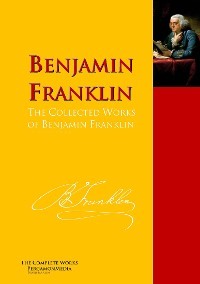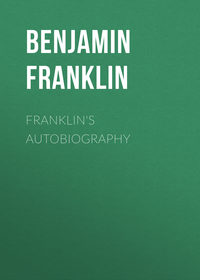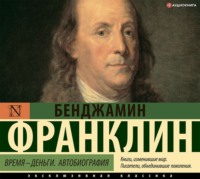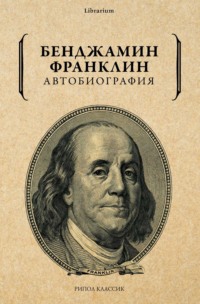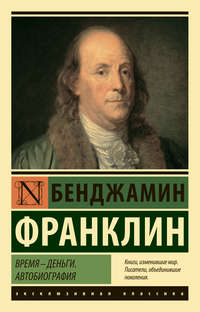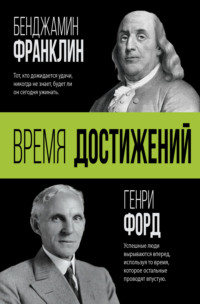![Memoirs of Benjamin Franklin; Written by Himself. [Vol. 2 of 2]](/covers_330/24858395.jpg) полная версия
полная версияMemoirs of Benjamin Franklin; Written by Himself. [Vol. 2 of 2]
"We all join in respects to Mrs. Shipley."
"Mrs. Hewson, London"Philadelphia, May 6, 1786."My dear Friend,
"A long winter has passed, and I have not had the pleasure of a line from you, acquainting me with your and your childrens' welfare, since I left England. I suppose you have been in Yorkshire, out of the way and knowledge of opportunities, for I will not think you have forgotten me. To make me some amends, I received a few days past a large packet from Mr. Williams, dated September, 1776, near ten years since, containing three letters from you, one of December 12, 1775. This packet had been received by Mr. Bache after my departure for France, lay dormant among his papers during all my absence, and has just now broke out upon me like words that had been, as somebody says, congealed in Northern air. Therein I find all the pleasing little family history of your children; how William had began to spell, overcoming by strength of memory all the difficulty occasioned by the common wretched alphabet, while you were convinced of the utility of our new one. How Tom, genius-like, struck out new paths, and, relinquishing the old names of the letters, called U bell and P bottle. How Eliza began to grow jolly, that is, fat and handsome, resembling Aunt Rooke, whom I used to call my lovely. Together with all the then news of Lady Blunt's having produced at length a boy; of Dolly's being well, and of poor good Catharine's decease. Of your affairs with Muir and Atkinson, and of their contract for feeding the fish in the Channel. Of the Vinys, and their jaunt to Cambridge in the long carriages. Of Dolly's journey to Wales with Mr. Scot. Of the Wilkeses, the Pearces, Elphinston, &c., &c. Concluding with a kind promise that, as soon as the ministry and Congress agreed to make peace, I should have you with me in America. That peace has been some time made, but, alas! the promise is not yet fulfilled. And why is it not fulfilled?
"I have found my family here in health, good circumstances, and well respected by their fellow-citizens. The companions of my youth are indeed almost all departed, but I find an agreeable society among their children and grandchildren. I have public business enough to preserve me from ennui, and private amusement besides, in conversation, books, and my garden. Considering our well-furnished plentiful market as the best of gardens, I am turning mine, in the midst of which my house stands, into grassplats and gravel-walks, with trees and flowering shrubs. * * *
"Temple has turned his thoughts to agriculture, which he pursues ardently, being in possession of a fine farm that his father lately conveyed to him. Ben is finishing his studies at college, and continues to behave as well as when you knew him, so that I still think he will make you a good son. His younger brothers and sisters are also all promising, appearing to have good tempers and dispositions, as well as good constitutions. As to myself, I think my general health and spirits rather better than when you saw me, and the particular malady I then complained of continues tolerable. With sincere and very great esteem, I am ever, my dear friend, yours most affectionately,
"B. Franklin.""To M. Veillard"Philadelphia, April 15, 1787"My dear Friend,
"I am quite of your opinion, that our independence is not quite complete till we have discharged our public debt. This state is not behindhand in its proportion, and those who are in arrear are actually employed in contriving means to discharge their respective balances; but they are not all equally diligent in the business, nor equally successful; the whole will, however, be paid, I am persuaded, in a few years.
"The English have not yet delivered up the posts on our frontier agreeable to treaty; the pretence is, that our merchants here have not paid their debts. I was a little provoked when I first heard this, and I wrote some remarks upon it, which I send you: they have been written near a year, but I have not yet published them, being unwilling to encourage any of our people who may be able to pay in their neglect of that duty. The paper is therefore only for your amusement, and that of our excellent friend the Duke de la Rochefoucauld.
"As to my malady, concerning which you so kindly inquire, I have never had the least doubt of its being the stone, and I am sensible that it has increased; but, on the whole, it does not give me more pain than when at Passy. People who live long, who will drink of the cup of life to the very bottom, must expect to meet with some of the usual dregs; and when I reflect on the number of terrible maladies human nature is subject to, I think myself favoured in having to my share only the stone and gout.
"You were right in conjecturing that I wrote the remarks on the 'thoughts concerning executive justice.' I have no copy of these remarks at hand, and forget how the saying was introduced, that it is better a thousand guilty persons should escape than one innocent suffer. Your criticisms thereon appear to be just, and I imagine you may have misapprehended my intention in mentioning it. I always thought with you, that the prejudice in Europe, which supposes a family dishonoured by the punishment of one of its members, was very absurd, it being, on the contrary, my opinion, that a rogue hanged out of a family does it more honour than ten that live in it.
B. Franklin.""Mr. Jordain"Philadelphia, May 18, 1787."Dear Sir,
"I received your very kind letter of February 27, together with the cask of porter you have been so good as to send me. We have here at present what the French call une assemblée des notables, a convention composed of some of the principal people from the several states of our confederation. They did me the honour of dining with me last Wednesday, when the cask was broached, and its contents met with the most cordial reception and universal approbation. In short, the company agreed unanimously that it was the best porter they had ever tasted. Accept my thanks, a poor return, but all I can make at present.
"Your letter reminds me of many happy days we have passed together, and the dear friends with whom we passed them; some of whom, alas! have left us, and we must regret their loss, although our Hawkesworth33 is become an adventurer in more happy regions; and our Stanley34 gone, 'where only his own harmony can be exceeded.' You give me joy in telling me that you are 'on the pinnacle of content.' Without it no situation can be happy; with it, any. One means of becoming content with one's situation is the comparing it with a worse Thus, when I consider how many terrible diseases the human body is liable to, I comfort myself that only three incurable ones have fallen to my share, the gout, the stone, and old age; and that these have not yet deprived me of my natural cheerfulness, my delight in books, and enjoyment of social conversation.
"I am glad to hear that Mr. Fitzmaurice is married, and has an amiable lady and children. It is a better plan than that he once proposed, of getting Mrs. Wright to make him a waxwork wife to sit at the head of his table. For, after all, wedlock is the natural state of man. A bachelor is not a complete human being. He is like the odd half of a pair of scissors, which has not yet found its fellow, and, therefore, is not even half so useful as they might be together.
"I hardly know which to admire most, the wonderful discoveries made by Herschel, or the indefatigable ingenuity by which he has been enabled to make them. Let us hope, my friend, that, when free from these bodily embarrassments, we may roam together through some of the systems he has explored, conducted by some of our old companions already acquainted with them. Hawkesworth will enliven our progress with his cheerful, sensible converse, and Stanley accompany the music of the spheres.
"Mr. Watraaugh tells me, for I immediately inquired after her, that your daughter is alive and well. I remember her a most promising and beautiful child, and therefore do not wonder that she is grown, as he says, a fine woman.
"God bless her and you, my dear friend, and everything that pertains to you, is the sincere prayer of yours most affectionately,
"B. Franklin,"In his 82d year.""To Miss Hubbard"I condole with you. We have lost a most dear and valuable relation. But it is the will of God and nature that these mortal bodies be laid aside, when the soul is to enter into real life. This is rather an embryo state, a preparation for living. A man is not completely born until he be dead. Why, then, should we grieve that a new child is born among the immortals, a new member added to their happy society? We are spirits. That bodies should be lent us while they can afford us pleasure, to assist us in acquiring knowledge, or doing good to our fellow-creatures, is a kind and benevolent act of God. When they become unfit for these purposes, and afford us pain instead of pleasure, instead of an aid become an encumbrance, and answer none of the intentions for which they were given, it is equally kind and benevolent that a way is provided by which we may get rid of them. Death is that way. We ourselves, in some cases, prudently choose a partial death. A mangled, painful limb, which cannot be restored, we willingly cut off. He who plucks out a tooth, parts with it freely, since the pain goes with it; and he who quits the whole body, parts at once with all pains, and possibilities of pains and diseases it was liable to, or capable of making him suffer.
"Our friend and we were invited abroad on a party of pleasure which is to last for ever. His chair was ready first, and he is gone before us. We could not all conveniently start together; and why should you and I be grieved at this, since we are soon to follow, and know where to find him?
"Adieu,B. Franklin.""To George Wheatley"Philadelphia, May 18, 1787."I received duly my good old friend's letter of the 19th of February. I thank you much for your notes on banks; they are just and solid, as far as I can judge of them. Our bank here has met with great opposition, partly from envy, and partly from those who wish an emission of more paper money, which they think the bank influence prevents. But it has stood all attacks, and went on well, notwithstanding the Assembly repealed its charter. A new Assembly has restored it, and the management is so prudent that I have no doubt of its continuing to go on well: the dividend has never been less than six per cent., nor will that be augmented for some time, as the surplus profit is reserved to face accidents. The dividend of eleven per cent., which was once made, was from a circumstance scarce unavoidable. A new company was proposed, and prevented only by admitting a number of new partners. As many of the first set were averse to this and chose to withdraw, it was necessary to settle their accounts; so all were adjusted, the profits shared that had been accumulated, and the new and old proprietors jointly began on a new and equal footing. Their notes are always instantly paid on demand, and pass on all occasions as readily as silver, because they will produce silver.
"Your medallion is in good company; it is placed with those of Lord Chatham, Lord Camden. Marquis of Rockingham, Sir George Saville, and some others who honoured me with a show of friendly regard when in England. I believe I have thanked you for it, but I thank you again.
"I believe with you, that if our plenipo. is desirous of concluding a treaty of commerce, he may need patience. If I were in his place and not otherwise instructed, I should be apt to say 'take your own time, gentlemen.' If the treaty cannot be made as much to your advantage as ours, don't make it. I am sure the want of it is not more to our disadvantage than to yours. Let the merchants on both sides treat with one another. Laissez les faire.
"I have never considered attentively the Congress's scheme for coining, and I have it not now at hand, so that at present I can say nothing to it. The chief uses of coining seem to be the ascertaining the fineness of the metals, and saving the time that would otherwise be spent in weighing to ascertain the quantity. But the convenience of fixed values to pieces is so great as to force the currency of some whose stamp is worn off, that should have assured their fineness, and which are evidently not of half their due weight; the case at present with the sixpences in England, which, one with another, do not weigh threepence.
"You are now 78, and I am 82; you tread fast upon my heels; but, though you have more strength and spirit, you cannot come up with me until I stop, which must now be soon; for I am grown so old as to have buried most of the friends of my youth; and I now often hear persons whom I knew when children, called old Mr. Such-a-one, to distinguish them from their sons, now men grown and in business; so that, by living twelve years beyond David's period, I seem to have intruded myself into the company of posterity when I ought to have been abed and asleep. Yet, had I gone at seventy, it would have cut off twelve of the most active years of my life, employed, too, in matters of the greatest importance; but whether I have been doing good or mischief is for time to discover. I only know that I intended well, and I hope all will end well.
"Be so good as to present my affectionate respects to Dr. Riley. I am under great obligations to him, and shall write to him shortly. It will be a pleasure to him to know that my malady does not grow sensibly worse, and that is a great point; for it has always been so tolerable as not to prevent my enjoying the pleasures of society, and being cheerful in conversation; I owe this in a great measure to his good counsels.
"B. Franklin.""B. Vaughan"October 24, 1788."Having now finished my term in the presidentship, and resolving to engage no more in public affairs, I hope to be a better correspondent for the little time I have to live. I am recovering from a long-continued gout, and am diligently employed in writing the History of my Life, to the doing of which the persuasions contained in your letter of January 31, 1783, have not a little contributed. I am now in the year 1756, just before I was sent to England. To shorten the work, as well as for other reasons, I omit all facts and transactions that may not have a tendency to benefit the young reader, by showing him from my example, and my success in emerging from poverty, and acquiring some degree of wealth, power, and reputation, the advantages of certain modes of conduct which I observed, and of avoiding the errors which were prejudicial to me. If a writer can judge properly of his own work, I fancy, on reading over what is already done, that the book may be found entertaining and useful, more so than I expected when I began it. If my present state of health continues, I hope to finish it this winter: when done, you shall have a manuscript copy of it, that I may obtain from your judgment and friendship such remarks as may contribute to its improvement.
"The violence of our party debates about the new constitution seems much abated, indeed almost extinct, and we are getting fast into good order. I kept out of those disputes pretty well, having wrote only one piece, which I send you enclosed.
"I regret the immense quantity of misery brought upon mankind by this Turkish war; and I am afraid the King of Sweden may burn his fingers by attacking Russia. When will princes learn arithmetic enough to calculate, if they want pieces of one another's territory, how much cheaper it would be to buy them than to make war for them, even though they were to give a hundred years' purchase; but if glory cannot be valued, and, therefore, the wars for it cannot be subject to arithmetical calculation, so as to show their advantages or disadvantages, at least wars for trade, which have gain for their object, may be proper subjects for such computation; and a trading nation, as well as a single trader, ought to calculate the probabilities of profit and loss before engaging in any considerable adventure. This, however, nations seldom do, and we have had frequent instances of their spending more money in wars for acquiring or securing branches of commerce, than a hundred years' profit, or the full enjoyment of them can compensate. * *
"B. Franklin.""To the President of Congress"Philadelphia, Nov. 29, 1788."Sir,
"When I had the honour of being the minister of the United States at the court of France, Mr. Barclay arriving there, brought me the following resolution of Congress:
"'Resolved, That a commissioner be appointed by Congress with full power and authority to liquidate and finally to settle the accounts of all the servants of the United States who have been intrusted with the expenditure of public money in Europe, and to commence and prosecute such suits, causes, and actions as may be necessary for that purpose, or for the recovery of any property of the said United States in the hands of any person or persons whatsoever.
"'That the said commissioner be authorized to appoint one or more clerks, with such allowance as he may think reasonable.
"'That the said commissioner and clerks respectively take an oath, before some person duly authorized to administer an oath, faithfully to execute the trust reposed in them respectively.
"'Congress proceeded to the election of a commissioner, and ballots being taken, Mr. T. Barclay was elected.'
"In pursuance of this resolution, and as soon as Mr. Barclay was at leisure from more pressing business, I rendered to him all my accounts, which he examined and stated methodically. By his statements he found a balance due to me on the 4th May, 1785, of 7533 livres, 19 sols, 3 deniers, which I accordingly received of the Congress Bank; the difference between my statement and his being only seven sols, which by mistake I had overcharged, about threepence halfpenny sterling.
"At my request, however, the accounts were left open for the consideration of Congress, and not finally settled, there being some articles on which I desired their judgment, and having some equitable demands, as I thought them, for extra services, which he had not conceived himself empowered to allow, and therefore I did not put them in my account. He transmitted the accounts to Congress, and had advice of their being received. On my arrival at Philadelphia, one of the first things I did was to despatch my grandson, W. T. Franklin, to New-York, to obtain a final settlement of those accounts, he having long acted as my secretary, and, being well acquainted with the transactions, was able to give an explanation of the articles that might seem to require explaining, if any such there were. He returned without effecting the settlement, being told that it would not be made till the arrival of some documents expected from France. What those documents were I have not been informed, nor can I readily conceive, as all the vouchers existing there had been examined by Mr. Barclay. And I having been immediately after my arrival engaged in public business of this state, I waited in expectation of hearing from Congress, in case any part of my accounts had been objected to.
"It is now more than three years that those accounts have been before that honourable body, and to this day no notice of any such objection has been communicated to me. But reports have for some time past been circulated here, and propagated in newspapers, that I am greatly indebted to the United States for large sums that had been put into my hands, and that I avoid a settlement.
"This, together with the little time one of my age may expect to live, makes it necessary for me to request earnestly, which I hereby do, that the Congress would be pleased, without farther delay, to examine those accounts, and if they find therein any article or articles which they do not understand or approve, that they would cause me to be acquainted with the same, that I may have an opportunity of offering such explanations or reasons in support of them as may be in my power, and then that the account may be finally closed.
"I hope the Congress will soon be able to attend to this business for the satisfaction of the public, as well as in condescension to my request. In the mean time, if there be no impropriety in it, I would desire that this letter, together with another on the same subject, the copy of which is hereto annexed, be put upon their minutes.
"B. Franklin.""Mrs. Green"Philadelphia, March 2, 1789."Dear Friend,
"Having now done with public affairs, which have hitherto taken up so much of my time, I shall endeavour to enjoy, during the small remainder of life that is left to me, some of the pleasures of conversing with my old friends by writing, since their distance prevents my hope of seeing them again.
"I received one of the bags of sweet corn you was so good as to send me a long time since, but the other never came to hand; even the letter mentioning it, though dated December 10, 1787, has been above a year on its way, for I received it but about two weeks since from Baltimore, in Maryland. The corn I did receive was excellent, and gave me great pleasure. Accept my hearty thanks.
"I am, as you suppose in the above-mentioned old letter, much pleased to hear that my young friend Ray is 'smart in the farming way,' and makes such substantial fences. I think agriculture the most honourable of all employments, being the most independent. The farmer has no need of popular favour, nor the favour of the great; the success of his crops depending only on the blessing of God upon his honest industry. I congratulate your good spouse, that he as well as myself is now free from public cares, and that he can bend his whole attention to his farming, which will afford him both profit and pleasure; a business which nobody knows better how to manage with advantage. I am too old to follow printing again myself, but, loving the business, I have brought up my grandson Benjamin to it, and have built and furnished a printing-house for him, which he now manages under my eye. I have great pleasure in the rest of my grandchildren, who are now in number eight, and all promising, the youngest only six months old, but shows signs of great good-nature. My friends here are numerous, and I enjoy as much of their conversation as I can reasonably wish; and I have as much health and cheerfulness as can well be expected at my age, now eighty-two. Hitherto this long life has been tolerably happy, so that, if I were allowed to live it over again, I should make no objection, only wishing for leave to do, what authors do in a second edition of their works, correct some of my errata. Among the felicities of my life I reckon your friendship, which I shall remember with pleasure as long as life lasts, being ever, my dear friend, yours most affectionately,
"B. Franklin.""Dr. Price"Philadelphia, May 31, 1789."My very dear Friend,
"I lately received your kind letter, enclosing one from Miss Kitty Shipley, informing me of the good bishop's decease, which afflicted me greatly. My friends drop off one after another, when my age and infirmities prevent me making new ones, and if I still retain the necessary activity and ability, I hardly see among the existing generation where I could make them of equal goodness. So that, the longer I live, I must expect to be the more wretched. As we draw nearer the conclusion of life, nature furnishes us with more helps to wean us from it, among which one of the most powerful is the loss of such dear friends.
"I send you with this the two volumes of our Transactions, as I forget whether you had the first before. If you had, you will please to give this to the French ambassador, requesting his conveyance of it to the good Duke de la Rochefoucauld. My best wishes attend you, being ever, with sincere and great esteem, my dear friend, yours most affectionately,
B. Franklin.""B. Vaughan"Philadelphia, June 3, 1789."My dearest Friend,
"I received your kind letter of March 4, and wish I may be able to complete what you so earnestly desire, the Memoirs of my Life. But of late I am so interrupted by extreme pain, which obliges me to have recourse to opium, that between the effects of both I have but little time in which I can write anything. My grandson, however, is copying what is done, which will be sent to you for your opinion, by the next vessel; and not merely for your opinion, but for your advice; for I find it a difficult task to speak decently and properly of one's own conduct; and I feel the want of a judicious friend to encourage me in scratching out.


